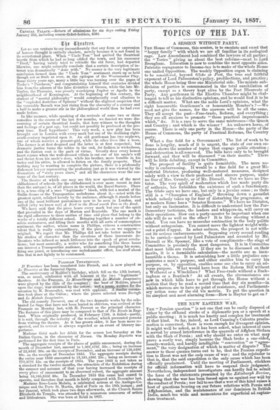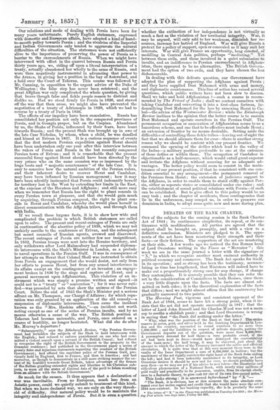THE NEW EASTERN WAR.
THE "Persian question" is not one that can be easily disposed of either by the offhand stroke of a diplomatic pen or a speech at a public meeting; it is much too knotty and, complex for treatment of that kind. So far, indeed, as Lord Canning 's Calcutta proclamation is concerned, there is room enough for divergent opinion. It might well be asked, as it has been asked, what interest of ours is served by armed interference in the quarrels of Affghan Birders with the Shah of Persia ; and why should we enter on what may prove a costlywar, simply because the Shah broke a one-sided, loosely-worded, and hardly intelligible "convention" or "agreement" the very designation of which is matter of dispute ? The answer to these queries turns out to be, that the Persian expedition to Herat was not the only cause of war; and the rejoinder to that is, that the said expedition is the only cease which has been officially proclaimed. Until the meeting of Parliament, sticklers for official information will have to suspend their judgment. Nevertheless, independent investigators can hardly fail to admit the force of the statements presented by the Edinburgh Review, showing that the war has been forced upon us against our will by the conduct of Persia ; nor fail to see that a war of this kind raises a host of questiolm bearing on our future relations with Persia and Affghanistan, and the maintenance of our dominion in British India, much too wide and momentous for superficial ad captandum treatment. Our relations and mode of dealing with Persia have been for many years =fortunate. Purely English statesmen, engrossed with domestic and European affairs, have adopted a kind of handto-mouth policy towards Persia ; and the rivalries of the Imperial and Indian -Governments only tended to aggravate the natural difficulties of the situation, The statesmen were not sufficiently alive to the importance of preserving the “wer of Persia as a barrier to the encroachments of Russia, " en we might have intervened with effect in the quarrel between Russia and Persia thirty years ago, we, riding off upon a literal interpretation of a treaty, actually abandoned her wholly to the arms of Russia, and were thus negatively instrumental in advancing that power to the Araxes, in giving her a position in the bay of Asterabad, and a hold over the Court of Teheran. This course was followed by Mr. Canning, in opposition to the urgent advice of the Duke of Wellington ; the false step has never been retrieved ; and the great Afghan war only complicated the whole question, by giving that brave though false and fickle people reason to distrust and dislike us. Had we stood firmly for Persia in 1826, and staved off the war that then arose, we might also have prevented the negotiation of a treaty of Adrianople in 1829, which we had to reverse by a treaty of Paris in 180.
The effects of our impolicy have been emulative. Russia has consolidated her position not only in the conquered provinces of Persia, and in Georgia proper, but on the Caspian. Abandoned by us, the Shahs of Persia, influenced by their fears, have leant towards Russia; and the present Shah was brought up in awe of the late Czar Nicholas, by whom, when a child, he was dandled and kissed at Erivan in 1837. It is a curious sequence of events that the first modern Persian expedition against Herat should have been undertaken only one year after this interview between the rulers of Persia and Russia in the but recently conquered Persian town of Erivan ; and it is remarkable that the present successful foray against Herat should 'have been directed by the very prince who on the same occasion was so impressed by the huge boots and "majestic countenance" of the late Czar. It is easy to conceive how the natural ambition of the Persian rulers, and their inherent desire to recover Herat and Candahar, may have been inflamed by Russian management ; hew it may have been adroitly insinuated that Persia could indemnify herself for territory lost in the West by extending her limits in the East, at the expense of the Heratees and Afghans; and still more easy when we remember that Russia has the right to plant consuls in every Persian town at pleasure, and that she would gain much by acquiring, through Persian conquest, the right to plant consuls in Herat and Candahar, whereby she would place herself in direct communication with the Afghan tribes, and through them with India.
If we recall these bygone facts, it is to show how wide and complicated the problem is which British statesmen are called upon to solve. The present and recent outrages of Persia are only in continuation of the abortive policy of 1838, whioh we may not unfairly ascribe to the conference at Erivan, and the subsequent but secret councils of Russian agents, avowed and disavowed. The recent outrages of Persia are neither few nor insignificant. In 1852, Persian troops were sent into the Heratee territory, and only withdrawn after Lord Malmesbuiy had suspended diplomatic intercourse with the Shah's Minister in London, as a prelude to naval operations in the Persian Gulf. It was in consequence of her attempts on Herat that Colonel Sheil was instructed to obtain from Persia an engagement that she would desist, not only from her efforts to possess Herat, but from any armed interference in its affairs except on the contingency of an invasion ; an engagement broken in 180 by the siege and capture of Herat, and a general movement upon Afghanistan. This violation of an instrument which was simply a promise written and signed—it could not be a " treaty " or " eonvention " ; for it was never ratified—was preceded by acts that show the animus of the Persian Court. Before the end of 180 the Shah's Minister put a serious affront on Mr. Thompson, our Charge d'Affaires ; for which reparation was only granted by an application of the old remedy—a suspension of diplomatic intercourse. Then came the incident known as the "Mrs. Hashim affair,"—an incident not worth noting except as one of the series of Persian insults, and by no means otherwise a cause of the war. The British position at Teheran had become untenable, and Persia, once entered on a course of hostility, no longer hesitated. What did she do after Mr. Murray's departure? "Subsequently" says the Edinburgh _Review, "the Persian Government had forbidden the subjects of the Shah to hold intercourse with the English; had refused to enforce punishment on one who had committed a violent assault upon a servant of the British Consul; had refused to recognize the right of the British Government to the property in the Consular residence; had published in the Government paper a series. of grossly false and injurious statements regarding the conduct. of the British Government ; had offered the maritime police of the Persian Gulf, meviously held by England, first to France, and then to America; and had moreover, as though to demonstrate in a still more striking manner the extent of its hostility towards Great Britain, taken advantage of the firman of the Sultan granting extended rights and liberties to his Christian subjects, to warn all the states of Central Asia of the peril to Islam resulting from an anima's with the British Government."
So much for the causes. It thus appears that a declaration of war was inevitable. From no European, much less from an Asiatic power, could we quietly submit to treatment of this kind. But when we have declared war, we are only on the very threshold of difficulty. Our natural policy would be to maintain the integrity and independence of Persia. But it is even a question whether the extinction of her independence is not virtually as much a fact as the violation of her territorial integrity. War, it may be argued, will only add to her weakness, diminish her re sources, increase her hatred of England. War will give Russia a pretext for a policy of support, open or concealed as it may suit her interests. War will give France an opportunity, long coveted, of meddling in Central Asia politics, perhaps "mediating." Yet between these evils, and those involved in a quiet submission to insults, and an indifference to Persian encroachment in Afghanistan, there appeared to be no alternative. The British Government had the option of two evils, and they have chosen the lose dishonourable.
In dealing with this delicate question, our Government have adopted the plan of supporting the Afghans against Persia ; and they have supplied Dost Mahomed with arms and money, arid, diplomatic countenance. This line of action has raised several questions, which public writers have not been slow to discuss. Shall we take and hold Afghanistan ?—such a course is recommended by The Friend (9' India : shall we content ourselves with taking Candahar and converting it into a first-class fortress, indemnifying Dost Mahomed for the loss by annexing Herat to Cabul—the advice of the Westminster Review; while the Edinburgh Review inclines to the opinion that the better course is to sustain Dost Mahomed and operate ourselves in the Persian Gulf. The permanent occupation or annexation of Afghanistan seems to us a hazardous scheme, and one that to be effective must include Herat ; an extension of frontier by no means desirable. Setting aside the difficulties of controlling those fickle tribes—leaving out of sight the fact that we should alienate them for ever—there is another strong reason why we should be content with our present frontier. We command the opening of the defiles which lead to the valley of the Indus—a military position preferable to one at the entrance of those defiles or within them. The occupation of Candahar is objectionable as a half-measure, which would entail great expense and irritate the Afghans without securing for us adequate advantages. The better policy would seem to consist in the maintenance of our present position, if that be consistent with one condition essential to any arrangement—the permanent removal of the Persians from Herat; the extension ot judicious support to the Affghans, in order to enable them to stand stiffly against Persia, either as separate states or consolidated under one ruler ; and the establishment of sound political relations with Persia—if suoh can be established. But to give effect to this policy would be no easy task ; and the chapter of accidents, those contingencies that lie in the unforeseen, may compel us, in order to preserve our dominion in India, to adopt some quite new and more daring plan.



































 Previous page
Previous page